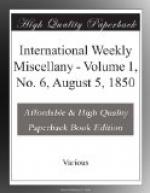He leans her head upon his breast—
She knew ’twas not her home of rest,
But, ah! she had been sore distrest.
The sacred stars looked sadly down;
The parting moon appeared to frown,
To see thus dimmed the diamond crown.
Then from the thicket starts a deer—
The huntsman seizing on his spear
Cries, ‘Maiden, wait thou for me
here.’
She sees him vanish into night—
She starts from sleep in deep affright,
For it was not her own true knight.
Though but in dream Gunhilda failed—
Though but a fancied ill assailed—
Though she but fancied fault bewailed—
Yet thought of day makes dream of night;
She is not worthy of the knight;
The inmost altar burns not bright.
If loneliness thou canst not bear—
Cannot the dragon’s venom dare—
Of the pure meed thou shouldst despair.
Now sadder that lone maiden sighs;
Far bitterer tears profane her eyes;
Crushed in the dust her heart’s
flower lies.’
“To show the evident carelessness with which this poem was constructed, I have italicized an identical rhyme (of about the same force in versification as an identical proposition in logic) and two grammatical improprieties. To lean is a neuter verb, and ’seizing on’ is not properly to be called a pleonasm, merely because it is—nothing at all. The concluding line is difficult of pronunciation through excess of consonants. I should have preferred, indeed, the ante-penultimate tristich as the finale of the poem.
“The supposition that the book of an author is a thing apart from the author’s self, is, I think, ill-founded. The soul is a cipher, in the sense of a cryptograph; and the shorter a cryptograph is, the more difficulty there is in its comprehension—at a certain point of brevity it would bid defiance to an army of Champollions. And thus he who has written very little, may in that little either conceal his spirit or convey quite an erroneous idea of it—of his acquirements, talents, temper, manner, tenor and depth (or shallowness) of thought—in a word of his character, of himself. But this is impossible with him who has written much. Of such a person we get, from his books, not merely a just, but the most just representation. Bulwer, the individual, personal man, in a green velvet waistcoat and amber gloves, is not by any means the veritable Sir Edward Lytton, who is discoverable only in ‘Ernest Maltravers,’ where his soul is deliberately and nakedly set forth. And who would ever know Dickens by looking at him or talking with him, or doing anything with him except reading his ‘Curiosity Shop?’ What poet, in especial, but must feel at least the better portion of himself more fairly represented in even his commonest sonnet, (earnestly written,) than in his most elaborate or most intimate personalities?




